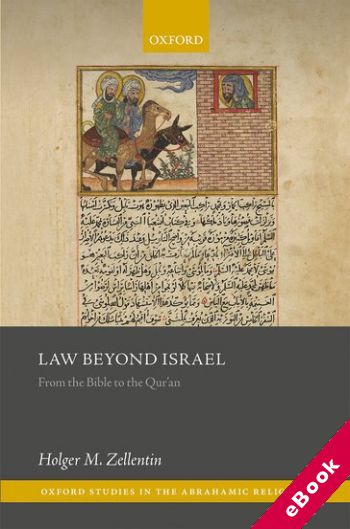We will be closed from 5pm Thursday 17th April for the Easter Bank Holidays, re-opening at 8.30am on Tuesday 22nd April. Any orders placed during this period will be processed when we re-open.

The device(s) you use to access the eBook content must be authorized with an Adobe ID before you download the product otherwise it will fail to register correctly.
For further information see https://www.wildy.com/ebook-formats
Once the order is confirmed an automated e-mail will be sent to you to allow you to download the eBook.
All eBooks are supplied firm sale and cannot be returned. If you believe there is a fault with your eBook then contact us on ebooks@wildy.com and we will help in resolving the issue. This does not affect your statutory rights.
The Hebrew Bible formulates two sets of law: one for the Israelites and one for the gentile “residents” living in the Holy Land. Law Beyond Israel: From the Bible to the Qur'an argues that these biblical laws for non-Israelites form the historical basis of qur'anic law. This volume corroborates its central claim by assessing laws for gentiles in late antique Jewish and especially in Christian legal discourse, pointing to previously underappreciated legal continuity from the Hebrew Bible to the New Testament and from late antique Christianity to nascent Islam.
This volume first sketches the legal obligations that the Hebrew Bible imposes on gentiles, on humanity more broadly and, more specifically, on the non-Israelite residents of the Holy Land. It then traces these laws through Second Temple Judaism to the early Jesus movement, illustrating how the biblical laws for residents inform those formulated in Acts of the Apostles. Building on this legal continuity, the study employs detailed historical and literary analyses of legal narratives in order to make three propositions. Firstly, rabbinic laws for gentiles, the so-called Noahide Laws, while offering a more lenient interpretation than the one we find in Acts, are equally based on the biblical laws for gentiles. Secondly, Christians generally appreciated and even expanded the gentile laws of Acts. Thirdly, the Qur'an reinvents Arabian religious practice by formulating its own distinctive approach to the biblical laws for gentiles, in close continuity with - and at times in critical distance from - late antique Jewish and especially Christian gentile law.